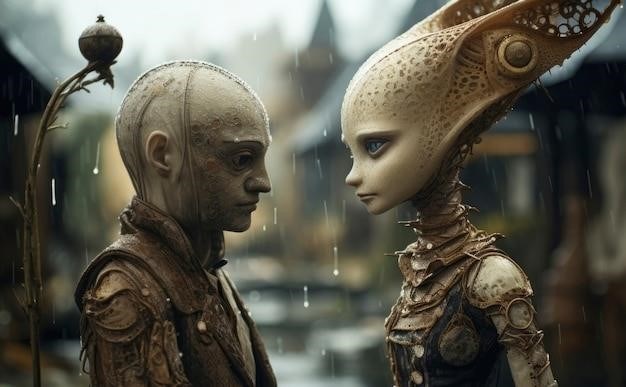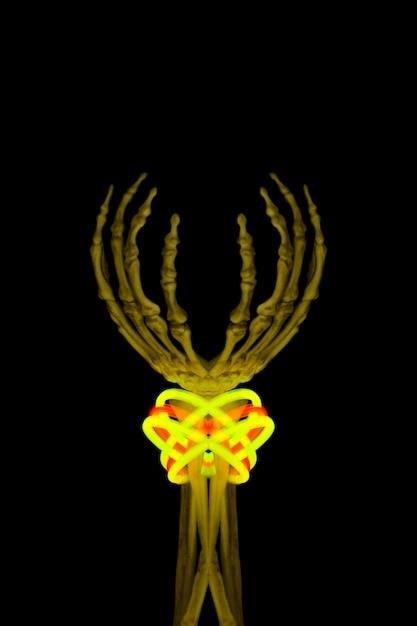The Cursed Alpha and His Forced Luna⁚ A Trope Exploration
This prevalent paranormal romance trope explores the complex relationship between a powerful alpha, often cursed, and a luna forced into a mating, examining the allure and ethical dilemmas inherent in such a narrative. The power dynamics and consent issues are central.
The Allure and Danger of the Trope
The “Cursed Alpha and His Forced Luna” trope’s appeal lies in its inherent dramatic tension. The forced mating creates immediate conflict, promising a journey of overcoming obstacles and building an unlikely bond. The alpha’s curse adds a layer of mystery and intrigue, hinting at a deeper, often tragic backstory. Readers are drawn to the forbidden nature of the relationship, the potential for growth and redemption, and the exploration of themes like power imbalances and consent. However, the trope treads dangerous ground. The forced nature of the relationship raises serious ethical questions, potentially romanticizing non-consensual acts. The line between compelling drama and harmful normalization becomes blurry, demanding careful handling by authors to avoid perpetuating harmful stereotypes.
The Cursed Alpha’s Backstory and Curse
Often, the alpha’s curse stems from a past transgression, a betrayal, or a supernatural event. This backstory adds depth and complexity to his character, humanizing him despite his powerful and often intimidating presence. The curse itself may manifest in various ways, from physical transformations and uncontrollable urges to emotional instability and a loss of control. It might be a consequence of dark magic, a family legacy, or a punishment from a higher power. The curse’s specifics often dictate the nature of the forced mating, creating a specific need for a particular type of luna to break the curse, adding another layer to the already complex dynamic. Understanding the alpha’s backstory and the nature of his curse is crucial to comprehending his actions and motivations within the narrative.
The Forced Luna’s Perspective and Agency
The forced luna’s perspective is vital; she’s not merely a passive recipient of the alpha’s actions. Her internal struggles, fears, and desires shape the narrative. The extent of her agency, or lack thereof, is a critical aspect. Is she completely helpless, or does she find ways to exert control, even subtly, within the confines of her forced relationship? Her resilience, her capacity for growth and change, and her ultimate acceptance or rejection of her situation are all crucial elements. Exploring her emotional journey, from initial fear and resentment to eventual understanding or defiance, adds significant depth. A strong narrative successfully navigates the complexities of her experience, acknowledging the ethical implications of forced mating while exploring the potential for growth and agency within the confines of the story.

Variations on the Theme
The “Cursed Alpha and His Forced Luna” trope offers diverse interpretations⁚ the nature of the curse, the types of Alphas and Lunas, and the nuanced power dynamics significantly alter the narrative.
The Nature of the Curse and its Implications
The curse afflicting the alpha werewolf is a crucial element, shaping the narrative’s trajectory and the characters’ motivations. Its origins vary widely; sometimes stemming from dark magic, ancient prophecies, or even a past transgression. The curse’s manifestation also differs, ranging from physical transformations (like Damien’s monstrous form on full moons) to emotional instability or supernatural weaknesses. The implications are far-reaching; it often necessitates a specific type of mate—a luna—to break the curse, leading to the forced mating central to the trope. The forced union is not simply a romantic entanglement; it’s a desperate attempt to alleviate suffering, restore balance, or even prevent catastrophic consequences for the alpha’s pack or the wider supernatural world. The curse’s severity and the alpha’s capacity to control it significantly influence the power dynamics and the level of coercion involved in the relationship.
Different Types of Alphas and Lunas
The alpha figures in these narratives are rarely monolithic. Some are initially reluctant participants in the forced mating, wrestling with their conscience and the implications of their actions. Others are domineering and fully aware of their power, using the curse as justification for their behavior. The luna characters are equally diverse. Some are strong and defiant, actively resisting the forced union and seeking agency within their circumstances. Others are initially vulnerable and naive, adapting to their roles as the alpha’s mate. The complexity of their personalities and their responses to the forced pairing are key aspects of this trope, enriching the narrative and exploring themes of power, consent, and resilience. The relationships between these varied alphas and lunas create a rich tapestry of possible outcomes, ranging from reluctant acceptance to explosive conflict and, ultimately, to unexpected love.
Power Dynamics and Consent
The “Cursed Alpha and His Forced Luna” trope inherently grapples with power imbalances and the complex issue of consent. The alpha’s power, often amplified by supernatural abilities or societal standing, creates a significant power dynamic with the luna, who is typically presented as less powerful or in a vulnerable position. The forced nature of the mating directly challenges the concept of consent, raising critical questions about agency and autonomy. The narrative’s handling of this central conflict often determines its ethical implications. A responsible narrative will not simply gloss over the coercion involved but instead acknowledge and explore the emotional and psychological consequences for the luna. The journey towards genuine consent, if it occurs, becomes a crucial part of the character arc and a test of the alpha’s capacity for empathy and understanding.
Popular Examples in Literature
Numerous paranormal romance novels and series feature variations of the “Cursed Alpha and His Forced Luna” trope, showcasing diverse character archetypes and relationships within this popular subgenre.
Specific Novels and Series Featuring this Trope
While specific titles aren’t directly named in the provided text excerpts, the numerous mentions of “The Cursed Alpha & His Forced Luna” across various online platforms (NovelOasis, Voyon, LeReader, Novelenders, Easynovel, Novellair, Novelbar, Yumread, Literie, and Metronovel) strongly suggest the existence of multiple novels utilizing this trope. The recurring theme in online discussions and the promotion of the novel across different apps indicates a significant presence within the paranormal romance genre. The frequent references to “Cursed Alpha” and “Forced Luna” in various contexts, including discussions about plot points and character interactions, points to a wide range of interpretations and adaptations of the core concept. The availability on multiple platforms hints at a potentially successful and widely read series, or at least a popular trope within the genre that has inspired many authors. The snippets of text reveal varying plot elements such as curses resulting from dark magic, the forced mating due to a prophecy or a necessity to break a curse, and the involvement of secondary characters like the Alpha’s father or rival packs. The breadth of mentions suggests a substantial body of literature centered around this trope.
Character Archetypes and Relationships
The “Cursed Alpha and His Forced Luna” trope frequently features a powerful, often brooding alpha male burdened by a supernatural curse, often depicted as a werewolf or similar creature. This alpha is typically portrayed as strong, protective of his pack, but also conflicted and perhaps initially unwilling to accept his fated mate. The forced luna, conversely, is often presented as initially resistant, even fearful, of the alpha’s power and the forced nature of their union. The relationship dynamic is central, showcasing a gradual shift from forced proximity to reluctant acceptance, then possibly love. Secondary characters, such as rival alphas, witches who cast the curse, or family members, often play crucial roles in shaping the central couple’s relationship and conflicts. These secondary characters can act as antagonists, catalysts for growth, or sources of support, adding layers of complexity to the narrative. The power dynamic between the alpha and luna is a key element, explored through themes of dominance, submission, and the eventual negotiation of consent and agency within the relationship. The evolution of their relationship forms the emotional core of the story.
The Role of Secondary Characters
In narratives exploring the “Cursed Alpha and His Forced Luna” trope, secondary characters play pivotal roles in enriching the story’s complexity and emotional depth. These supporting characters often serve as catalysts for conflict or resolution within the central relationship. Rival alphas, for instance, might challenge the cursed alpha’s authority or attempt to steal the luna, creating external conflict and forcing the protagonists to confront their feelings. Wise elders or mentors can offer guidance and support to the luna, helping her navigate the challenges of her forced union. Conversely, manipulative antagonists, such as vengeful witches or jealous rivals, can create obstacles and heighten tension. Family members of both the alpha and the luna can also significantly influence the narrative, providing either support or resistance to the relationship. These supporting roles enhance the plot by expanding the world-building, adding layers of intrigue, and creating opportunities for character development beyond the central couple. Their actions and motivations often shape the overall trajectory of the story, influencing the resolution and emotional impact.

Ethical Considerations and Criticisms
The “Cursed Alpha and His Forced Luna” trope often faces criticism for its depiction of non-consensual relationships and the normalization of coercive behavior within romantic narratives.
The Issue of Forced Mating in Romance
The portrayal of forced mating in the “Cursed Alpha and His Forced Luna” trope sparks considerable debate. Many argue that romanticizing non-consensual acts is harmful, potentially minimizing the gravity of sexual assault and coercion in real-life scenarios. Conversely, some readers find the trope appealing due to its exploration of power dynamics and the eventual development of consent and love within the relationship. However, this perspective often depends heavily on the execution and the author’s handling of the forced aspect of the relationship. A crucial element is whether the narrative emphasizes the violation and trauma of forced mating or focuses primarily on the eventual romantic resolution, thereby potentially overlooking the serious ethical implications. The line between titillation and responsible storytelling is thin, and the success in navigating it determines whether the trope is viewed as exploitative or a nuanced exploration of complex themes. Authors must carefully consider the potential impact of their work and ensure that they are not inadvertently normalizing or trivializing harmful behaviors.
Exploring Consent and Agency within the Narrative
Central to responsible depictions of the “Cursed Alpha and His Forced Luna” trope is the exploration of consent and agency. A well-crafted narrative will not simply gloss over the initial violation but will delve into the protagonist’s emotional journey, showcasing their struggle to regain control and assert their autonomy. This involves demonstrating a clear shift from forced compliance to genuine consent. The alpha’s character arc is equally important; a compelling story will portray his understanding of his actions and his efforts to earn the luna’s trust and respect, demonstrating remorse and genuine change rather than expecting immediate forgiveness. The narrative needs to acknowledge the lasting impact of the initial violation, emphasizing that true consent cannot simply erase past trauma. Effective storytelling requires a nuanced portrayal of the complexities of consent, demonstrating a clear understanding that it is not a simple binary but a continuous process requiring mutual respect and ongoing communication. The absence of these elements risks trivializing the issue of consent and perpetuating harmful stereotypes.
Alternative Interpretations and Subversions
The “Cursed Alpha and His Forced Luna” trope, while often criticized for its inherent power imbalance, can be subverted and reinterpreted in compelling ways. Instead of focusing solely on the romantic relationship, authors can explore themes of found family, personal growth, and societal structures. The curse itself can be reimagined, not as a justification for forced mating but as a metaphor for societal pressures or internal conflicts. The luna’s agency can be amplified, portraying her as a strong, independent character who actively challenges the alpha’s authority and works towards her own liberation. Exploring the dynamics of power, the narrative can shift focus from a solely romantic resolution to one where the luna finds strength and agency outside of the relationship with the alpha. Furthermore, the alpha’s character can be deconstructed, showing his struggles with his curse and his attempts at genuine atonement, moving beyond simple redemption arcs. By shifting the narrative focus and creatively reimagining the established tropes, authors can create stories that engage with the ethical concerns while still delivering an engaging and satisfying read.


